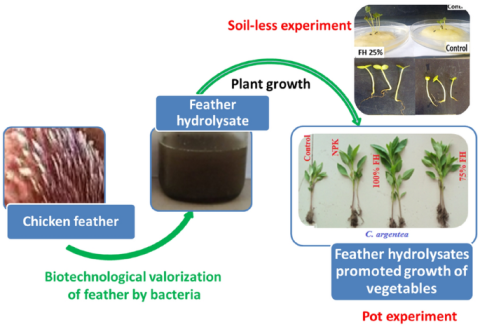Valorization of Feather by Bacillus safensis and Aquamicrobium defluvii for Growth Promotion in Leafy Vegetables
In 2020, we reported a keratinolytic strain of Aquamicrobium defluvii for the first time......
This study assessed novel keratinolytic bacteria for feather valorization to yield feather hydrolysates (FHs) to cultivate vegetables. Bacterial degradation of feather was determined through production of keratinase. Corchorus olitorius (Jute mallow), Celosia argentea (Cockscomb), and Amaranthus caudatus (Pendant amaranth) were grown with FHs through soil-less and pot experiments. Nitrogen and amino acid contents of FHs were determined, and the effects on soil microbes and fertility were studied. Aquamicrobium defluvii and Bacillus safensis degraded feather with keratinolytic activities of 45.2 and 56.7 U/ml, respectively. FHs improved seed germination by 1.29–1.67 folds and vigor index by 2.13–3.87 folds. In pot experiments, 50–100% FHs improved growth over control, while 100% FHs performed better than NPK in C. olitorius and C. argentea. In A. caudatus, NPK performed comparatively with 100% FHs. The FHs had nitrogen contents of 12.60–13.16% with abundance of glycine, alanine and leucine. FHs improved soil nitrogen content (27.91–37.21%) and organic carbon (24.11–29.46%) at 28 days, and stimulated soil microbial growth. The significant plant growth promotion and improved soil fertility demonstrated by FHs suggest their potential application as biofertilizers to promote sustainable agricultural production. To our knowledge, this represents first report of keratinolytic strain of Aquamicrobium defluvii and use of FHs to promote growth of C. olitorius, A. caudatus and C. argentea.
Published in Waste and Biomass Valorization: Link

